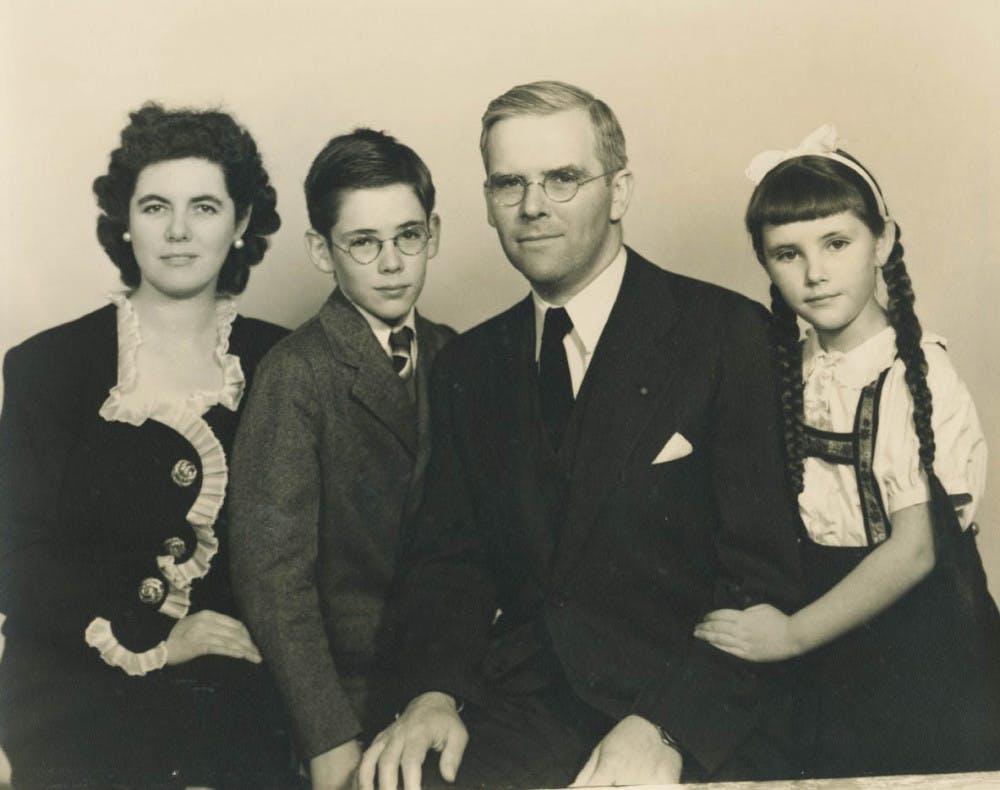Today, the John Hay Library will open the exhibit “A Hymn for the Brave: The Sharps and Humanitarian Work in World War II,” which will feature the heroic intervention of Waitstill and Martha Sharp in Nazi-occupied Europe. Martha’s studies at Brown marked the genesis of her family’s ties to the University, where her descendents have attended college and served as chancellor, faculty members and benefactors.
Waitstill P’58 GP’87 and Martha Sharp ’26 P’58 GP’87 are two of only five Americans honored as Righteous Among the Nations at Yad Vashem, the World Holocaust Remembrance Center in Jerusalem. Their induction, which occurred in a ceremony in June 2006, signifies their recognition by the State of Israel as part of a small minority who, “in a world of total moral collapse,” demonstrated extraordinary courage in risking their own lives to save those of people fleeing extermination by the Nazis.
The honor conferred on the Sharps was later underscored by a U.S. Senate resolution recognizing them as “genuine American heroes” and once again with an inscription on the Rescuers’ Wall at the U.S. Holocaust Memorial Museum. The honor was accepted on their behalf by their daughter, Professor Emerita of Archaeology and the Ancient World Martha Joukowsky ’58 PhB’82 LHD’85 P’87 GP’13 GP’14 GP’17, whose husband, Artemis Joukowsky II ’55 LLD’85 P’87 GP’13 GP’14 GP’17, served as chancellor.
The Sharps were “modest and ordinary people who responded to the suffering and needs around them … as they would have expected everyone to do in a similar situation,” said Professor Joukowsky at the Yad Vashem induction ceremony.
When the Sharps were asked by the Unitarian Church to travel to Czechoslovakia to aid refugees, they learned that 17 couples had already refused. They were the first to take up the gauntlet. Less than four years old when her parents left for Europe, Professor Joukowsky recalls that she “resented her parents for having been away.”
Waitstill was a Massachusetts Unitarian minister and Harvard graduate with a deeply felt objection to fascism, while Professor Joukowsky’s mother, Martha, was an active social worker who trained at Hull House after graduating from Pembroke College.
Waitstill “knew human frailty very well; he could see when people were in pain,” Professor Joukowsky said.
When the Sharps arrived in Prague, thousands were fleeing in the opposite direction. Throughout their mission in Czechoslovakia, the Sharps provided refugees with vital documents and money and helped them search for jobs overseas, acquire visas and secure transportation. The Sharps would also personally smuggle some of the most prominent anti-Nazis to safety through the heart of Germany, a crime that would have been punished severely by the Reich.
But the Sharps’ work, however fervent and heroic, was often heart-wrenchingly inadequate. Martha Sharp watched children leave for England on “Kindertransport” planes as their parents waved with forced smiles.
After Martha Sharp fled the Gestapo at the end of August 1939 to join her husband and return home, she began to lobby, unsuccessfully, the Alaskan governor to relocate 10,000 refugees to the remote, underpopulated land. The Sharps would soon depart for France and take up similar work, smuggling refugees from Vichy France over the Spanish border.
The history of the Sharps was researched, and, in many ways, discovered, by Artemis Joukowsky III, Professor Joukowsky’s son and Martha Sharp’s grandson.
Joukowsky III says the roots of this decades-long project took hold in a school assignment he was given as a boy, for which he was told to interview a person with moral courage. His mother suggested he speak to his grandmother.
Professor Joukowsky explained that her parents were reticent regarding their time in World War II, and the grandchildren were largely unaware of their grandparents’ bravery. “When your parents are heroic in any way, they don’t talk about it. … It took something out of them to put (it) into words,” she said.
Joukowsky III has since conducted thorough research and numerous interviews to document his grandparents’ endeavors. This work has culminated in the release of a new movie by PBS, “Defying the Nazis: The Sharps’ War,” which was co-directed by fellow Hampshire College graduate and leading documentary filmmaker Ken Burns and features the voice of Tom Hanks.
By the end of 1940, the Sharps had returned to America. They worked with the Dexters — a fellow Brown alum and his wife who also helped European refugees — to found the Unitarian Universalist Service Committee, a nonprofit, nonsectarian human rights organization. UUSC went on to rescue an estimated total of 2,000 refugees during World War II.
That “was a drop in the bucket,” said Matthew Justus, producer of “Defying the Nazis.” “But … that’s 130 people who can have great lives and be great Americans,” Justus said, referring to an estimate of the refugees directly rescued by the Sharps.
Justus explained that the many interviews with the now-adult children rescued by the Sharps serve not only to testify to the heroism of the Sharps, but also to underscore the significance and potential of each human life saved from genocide.
On Sept. 12, the Joukowsky family and the surviving refugees aided by the Sharps gathered at the White House and screened the film before holding a discussion with several senior White House policy makers. The discussion highlighted the role of the United States in countering (or failing to counter) genocide today, a subject to which many at the event drew parallels.
“That kind of selflessness is something that I don’t think we see that much of nowadays … and I think we should notice it and celebrate it,” said Holly Snyder, curator of the University’s American historical collections as well as of the exhibit.





